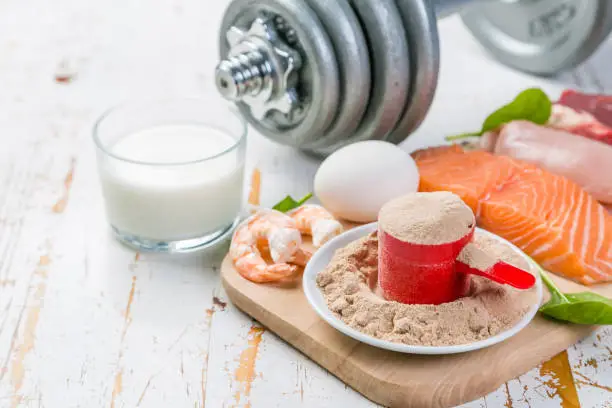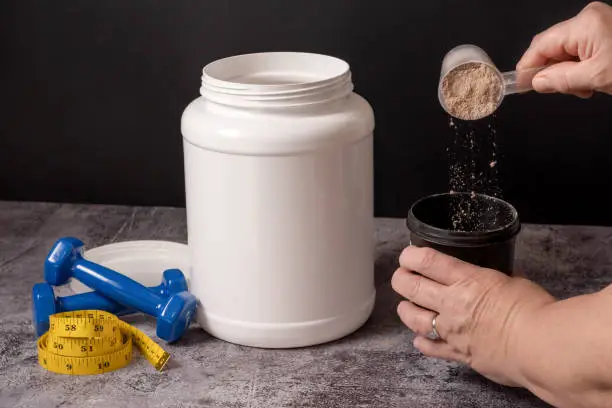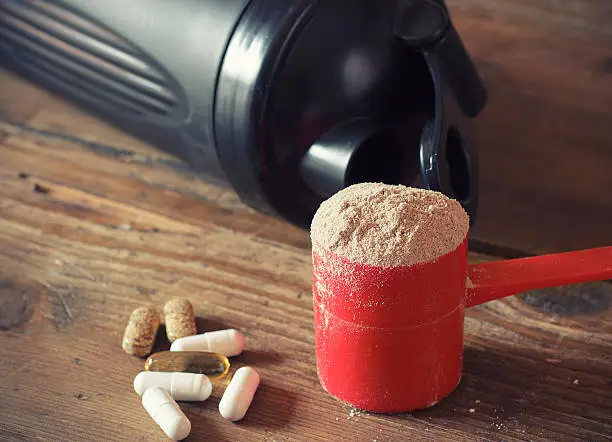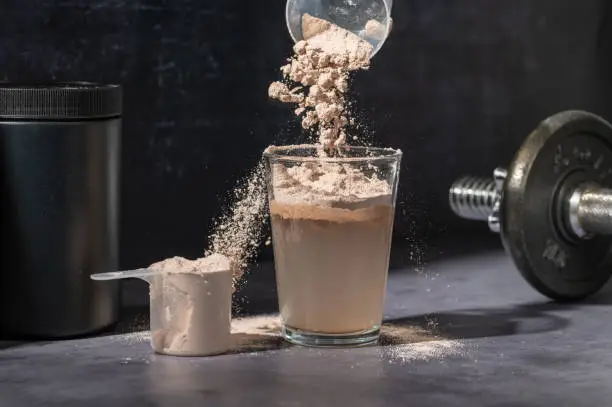The Amazing Health Benefits of Hydrolyzed Krill Protein for Joint and Muscle Health
Are you looking for a characteristic way to support your joints and muscles? Hydrolyzed krill protein is rising as a game-changer in the domain of well-being and wellness. Derived from krill, little crustaceans found in the ocean, this protein offers a wealth of benefits that can altogether move forward your joint well-being, muscle recuperation, and overall physical execution. Hydrolyzed krill protein is effortlessly retained by the body, conveying fundamental amino acids and supplements where they are needed most. Whether you're a competitor pushing your limits or somebody looking to keep up a dynamic way of life, hydrolyzed krill protein might be the lost piece in your wellness confusion. Dive in to find how this surprising fixing can change your approach to joint and muscle wellbeing!

Hydrolyzed Krill Protein: A Powerful Solution for Joint Health
The quest for effective joint health solutions has led many to explore the potential of hydrolyzed krill protein. This marine-derived ingredient is packed with benefits that can make a significant difference in managing joint discomfort and promoting overall joint well-being. Let's examine why hydrolyzed krill protein is gaining traction as a powerful ally in the fight against joint issues.
The Science Behind Krill Protein and Joint Support
Krill protein stands out due to its interesting composition, rich in basic amino acids and omega-3 fatty acids, especially EPA and DHA. These components work synergistically to bolster joint wellbeing at an essential level. Amino acids are the building squares of proteins, significant for repairing and keeping up joint tissues, while omega-3 fatty acids are known for their anti-inflammatory properties. Hydrolyzed krill protein experiences a handle called hydrolysis, which breaks down the protein into littler peptides. This makes it less demanding for the body to assimilate and utilize the supplements, improving its adequacy. Research shows that the bioactive peptides in hydrolyzed krill protein can stimulate the generation of collagen, a key component of cartilage. Collagen gives structure and adaptability to joints, helping to diminish firmness and progress portability.
Targeting Joint Discomfort and Stiffness
One of the primary reasons people seek joint health solutions is to relieve discomfort and stiffness. Hydrolyzed krill protein addresses these issues through multiple pathways. Its anti-inflammatory properties help to reduce swelling and tenderness in the joints, providing much-needed relief. Additionally, by promoting collagen synthesis, krill protein helps to maintain the integrity of cartilage, the cushioning tissue between joints. Cartilage degeneration is a common cause of joint stiffness and pain, especially in conditions like osteoarthritis. By supporting cartilage health, hydrolyzed krill protein can improve joint flexibility and range of motion. Many users report noticeable improvements in their ability to perform daily activities with less discomfort after incorporating krill protein into their routine.
Real-World Applications and Benefits
The benefits of hydrolyzed krill protein for joint health extend beyond the lab. Numerous studies and anecdotal evidence highlight its positive impact on individuals with joint issues. For example, studies have shown that krill oil supplementation can significantly reduce pain scores and improve physical function in people with osteoarthritis. Hydrolyzed krill protein offers a more targeted and efficient way to deliver these benefits. Its enhanced bioavailability ensures that the active compounds reach the joints more effectively, maximizing their therapeutic potential. This is particularly important for older adults, who may have difficulty absorbing nutrients from food or supplements.
Boosting Muscle Recovery with the Benefits of Krill Protein
Muscle recovery is a critical aspect of physical fitness, whether you're a professional athlete or someone who enjoys regular exercise. Hydrolyzed krill protein offers a range of benefits that can significantly enhance muscle recovery, reduce soreness, and improve overall performance. Let's explore how this remarkable ingredient can support your muscles after strenuous activity.
The Role of Amino Acids in Muscle Repair
Amino acids are the building squares of protein, and they play an imperative part in muscle repair and development. After a workout, muscles experience infinitesimal harm, and the body needs amino acids to repair these tissues. Hydrolyzed krill protein is a total protein source, meaning it contains all nine fundamental amino acids that the body cannot create on its own. These basic amino acids, counting branched-chain amino acids (BCAAs) like leucine, isoleucine, and valine, are especially vital for muscle recuperation. BCAAs help to diminish muscle protein breakdown, stimulate muscle protein blend, and diminish muscle soreness. By giving a promptly accessible source of these significant amino acids, hydrolyzed krill protein can quicken the recuperation process and help you get back to your workouts sooner.
Reducing Muscle Soreness and Inflammation
Delayed onset muscle soreness (DOMS) is a common encounter after serious exercise. It is caused by aggravation and minuscule harm to muscle filaments. Hydrolyzed krill protein can help to diminish muscle soreness and aggravation through a few components. The omega-3 fatty acids in krill protein have strong anti-inflammatory properties. They help to tweak the provocative reaction, lessening swelling and delicacy in the muscles. This can lighten distress and improve the run of movement, permitting you to recoup more comfortably.
The antioxidants in krill protein can protect muscle tissues from oxidative stress. Exercise increases the generation of free radicals, which can harm muscle cells and contribute to irritation. Antioxidants neutralize these free radicals, lessening oxidative push and advancing quicker recuperation. The amino acids in krill protein back the repair of harmed muscle strands. By giving the vital building squares for muscle protein blend, krill protein helps to modify and fortify muscles, diminishing soreness and making strides in general muscle work.
Optimizing Post-Workout Nutrition
Post-workout sustenance is basic for muscle recuperation. Expending the right supplements after exercise can help to renew glycogen stores, repair muscle tissues, and diminish aggravation. Hydrolyzed krill protein is a fabulous expansion to your post-workout schedule. It gives a promptly accessible source of amino acids, which are rapidly ingested and utilized by the muscles. This helps to kickstart the recuperation process and prevent muscle protein breakdown. Moreover, the omega-3 fatty acids in krill protein can help to diminish aggravation and advance general muscle wellbeing. Hydrolyzed krill protein can be effectively consolidated into shakes, smoothies, or other post-workout meals. Its gentle flavor and simple digestibility make it a helpful and viable way to support muscle recuperation. Whether you're a competitive competitor or a weekend warrior, hydrolyzed krill protein can help you recoup quicker and perform at your best.

How Hydrolyzed Krill Protein Supports Cartilage and Joint Flexibility?
Maintaining healthy cartilage and joint flexibility is crucial for overall mobility and quality of life. Hydrolyzed krill protein offers unique benefits that can support cartilage health, enhance joint flexibility, and reduce the risk of joint-related issues. Let's delve into the mechanisms by which krill protein promotes optimal joint function.
The Importance of Cartilage Health
Cartilage is a specialized connective tissue that pads the joints, permitting smooth and pain-free development. It acts as a shock safeguard, securing the bones from direct impact and lessening grinding. However, cartilage can be harmed by damage, abuse, or age-related degeneration, leading to joint torment, solidness, and diminished portability. Keeping up sound cartilage is fundamental for avoiding joint issues like osteoarthritis, a common condition characterized by the breakdown of cartilage. Hydrolyzed krill protein underpins cartilage wellbeing through a few key instruments, counting advanced collagen blend and lessening aggravation. Collagen is the primary basic protein in cartilage, giving it strength and versatility. Hydrolyzed krill protein contains amino acids that are fundamental for collagen generation. By giving these building pieces, krill protein helps to keep up the astuteness of cartilage and prevent its breakdown.
Enhancing Joint Flexibility and Range of Motion
Joint flexibility refers to the ability of a joint to move through its full range of motion. Loss of joint flexibility can lead to stiffness, pain, and difficulty performing everyday activities. Hydrolyzed krill protein can enhance joint flexibility by supporting cartilage health and reducing inflammation. Healthy cartilage allows for smooth and unrestricted movement of the joints. By promoting collagen synthesis and maintaining cartilage integrity, krill protein helps to improve joint flexibility and range of motion. Additionally, its anti-inflammatory properties can reduce swelling and stiffness, further enhancing joint mobility. Regular exercise and stretching are also important for maintaining joint flexibility. Incorporating hydrolyzed krill protein into your routine can complement these activities, helping you to achieve optimal joint function and mobility.
Preventing Joint Degeneration
Joint degeneration is a dynamic process that can lead to unremitting torment and inability. It is regularly caused by a combination of variables, including age, genetics, harm, and irritation. Hydrolyzed krill protein can help to anticipate joint degeneration by tending to these basic causes. Its anti-inflammatory properties can diminish the provocative reaction that contributes to cartilage breakdown. Moreover, its antioxidant substance can secure joint tissues from oxidative push, a process that can quicken joint degeneration. By supporting collagen amalgamation, krill protein helps to keep up the astuteness of cartilage and anticipate its breakdown.

The Role of Krill Protein in Reducing Inflammation and Pain
Inflammation and pain are common symptoms associated with various health conditions, including joint disorders, muscle injuries, and chronic diseases. Hydrolyzed krill protein has demonstrated promising anti-inflammatory and analgesic properties, making it a potential natural remedy for managing these symptoms. Let's explore how krill protein can help reduce inflammation and pain.
Targeting Inflammation at the Source
Inflammation is a complex natural reaction to damage or contamination. Whereas intense aggravation is a fundamental portion of the mending handle, persistent aggravation can damage tissues and contribute to different wellbeing issues. Hydrolyzed krill protein targets aggravation at its source through a few components. The omega-3 fatty acids in krill protein, especially EPA and DHA, are strong anti-inflammatory operators. They work by tweaking the generation of inflammatory particles, such as prostaglandins and leukotrienes. By lessening the levels of these particles, krill protein can help to dampen the incendiary reaction and ensure tissues from damage.
Alleviating Pain Naturally
Pain is a subjective involvement that can significantly impact quality of life. Hydrolyzed krill protein can help to ease torment actually by lessening aggravation and supporting tissue repair. Its anti-inflammatory properties can diminish swelling and delicacy in the influenced region, giving much-needed alleviation. Furthermore, the amino acids in krill protein can back the repair of harmed tissues, which can contribute to torment. By giving the building pieces for tissue recovery, krill protein helps to quicken the mending process and decrease torment.
Benefits for Various Conditions
The anti-inflammatory and pain-relieving properties of hydrolyzed krill protein make it beneficial for different conditions related to irritation and pain. These include joint disorders, such as osteoarthritis and rheumatoid arthritis; muscle wounds, such as strains and sprains; and persistent illnesses, such as fibromyalgia and inflammatory bowel infection. In joint disarranges, krill protein can help to diminish aggravation and torment in the joints, progressing versatility and quality of life. In muscle wounds, it can quicken the recuperating process and diminish soreness. In incessant maladies, it can help to oversee irritation and reduce torment indications.

Enhancing Athletic Performance with Hydrolyzed Krill Protein
Athletes are constantly seeking ways to improve their performance, whether it's increasing strength, enhancing endurance, or speeding up recovery. Hydrolyzed krill protein offers a range of benefits that can help athletes achieve their goals. Let's explore how krill protein can enhance athletic performance.
Boosting Endurance and Stamina
Endurance and stamina are crucial for athletes competing in endurance sports, such as running, cycling, and swimming. Hydrolyzed krill protein can help to boost endurance and stamina by improving oxygen delivery to muscles and reducing fatigue. The omega-3 fatty acids in krill protein, particularly EPA and DHA, play a vital role in improving cardiovascular function. They help to reduce inflammation in the blood vessels, improve blood flow, and enhance oxygen delivery to muscles. This can increase endurance and reduce fatigue during prolonged exercise.
Supporting Muscle Strength and Power
Muscle strength and power are essential for athletes competing in strength and power sports, such as weightlifting, sprinting, and jumping. Hydrolyzed krill protein can help to support muscle strength and power by promoting muscle protein synthesis and reducing muscle damage. The amino acids in krill protein, particularly BCAAs, stimulate muscle protein synthesis, the process by which muscles repair and grow. By providing the building blocks for muscle growth, krill protein helps athletes increase their muscle mass and strength. Additionally, the anti-inflammatory properties of krill protein can help to reduce muscle damage and soreness after intense exercise. This allows athletes to recover faster and train more frequently, leading to greater gains in muscle strength and power.
Accelerating Recovery and Reducing Injury Risk
Recovery is a critical aspect of athletic performance. Athletes need to recover quickly and efficiently after training and competition to prevent injuries and maintain their performance levels. Hydrolyzed krill protein can help to accelerate recovery and reduce injury risk by reducing inflammation, supporting tissue repair, and improving immune function. The anti-inflammatory properties of krill protein can help to reduce muscle soreness and inflammation after exercise, allowing athletes to recover more comfortably. Additionally, the amino acids in krill protein can support the repair of damaged tissues, accelerating the healing process.

Incorporating Krill Protein for Stronger Muscles and Healthier Joints
Incorporating hydrolyzed krill protein into your daily routine is a simple and effective way to support stronger muscles and healthier joints. Whether you're an athlete, a fitness enthusiast, or someone looking to improve their overall health, krill protein can be a valuable addition to your diet. Let's explore how to incorporate krill protein into your routine for optimal benefits.
Choosing the Right Krill Protein Supplement
When choosing a krill protein supplement, it's important to consider several factors, including the quality of the product, the dosage, and the form of the supplement. Look for a reputable brand that uses high-quality krill and employs a gentle hydrolysis process to preserve the integrity of the protein. Check the label to ensure that the supplement contains a sufficient amount of krill protein and omega-3 fatty acids. The recommended dosage may vary depending on your individual needs and goals, so it's best to consult with a healthcare professional or a registered dietitian. Krill protein supplements are available in various forms, including capsules, powders, and liquids. Choose the form that is most convenient for you and that you are most likely to take consistently.
Integrating Krill Protein into Your Diet
Hydrolyzed krill protein can be easily integrated into your diet in various ways. You can add it to shakes, smoothies, yogurt, or oatmeal. You can also mix it into baked goods, such as muffins or pancakes. Experiment with different recipes to find ways to incorporate krill protein into your favorite foods. Its mild flavor and easy digestibility make it a versatile ingredient that can be used in a wide range of dishes. Consider taking krill protein supplements with meals to enhance absorption and maximize its benefits. Consistency is key, so aim to incorporate krill protein into your diet on a regular basis to support stronger muscles and healthier joints.
Complementary Strategies for Muscle and Joint Health
While hydrolyzed krill protein can provide significant benefits for muscle and joint health, it's important to complement it with other strategies, such as regular exercise, a balanced diet, and adequate rest. Regular exercise helps to strengthen muscles, improve joint flexibility, and reduce the risk of injuries. A balanced diet provides the nutrients your body needs to repair tissues, reduce inflammation, and support overall health. Adequate rest allows your body to recover and rebuild after exercise.

Conclusion
Hydrolyzed krill protein is a powerhouse of nutrients, offering a multitude of benefits for both joint and muscle health. Its unique composition, rich in essential amino acids, omega-3 fatty acids, and antioxidants, makes it an excellent supplement for athletes, fitness enthusiasts, and anyone looking to improve their overall well-being. From reducing inflammation and pain to enhancing muscle recovery and supporting cartilage health, hydrolyzed krill protein stands out as a natural and effective solution. By incorporating this remarkable ingredient into your daily routine, you can unlock its full potential and experience the transformative effects on your joints and muscles.
Yangge Biotech Co., Ltd. is dedicated to providing innovative, high-quality raw material solutions. Our hydrolyzed krill protein is sourced and processed with the utmost care to ensure its purity and potency. With ISO, HACCP, Kosher, and Halal certifications, we guarantee the highest standards of quality and safety. Our dedicated R&D and production teams are committed to meeting your specific needs, and our 24-hour online services are always available to assist you. If you want to learn more about natural plant extracts and how hydrolyzed krill protein can benefit your products, please contact us at info@yanggebiotech.com.
References
1. De Luca, P., Pierno, A., Conte, V., Camerino, C., & Messina, G. (2021). Krill Oil Supplementation and Human Health: A Comprehensive Review. Nutrients, 13(1), 132.
2. Deutsch, L. (2007). Evaluation of the effect of Neptune Krill Oil on chronic inflammation and arthritic symptoms. Journal of the American College of Nutrition, 26(1), 39-48.
3. Bunea, R., El Farrah, K., & Deutsch, L. (2004). Evaluation of the effects of Neptune Krill Oil on the clinical course of hyperlipidemia. Alternative Medicine Review, 9(4), 420-428.
4. Talbott, S. M., Sorensen, B. A., Miller, S. L., Yu, T. W., Pugh, M. L. (2010). Influence of Superba Krill Oil on Serum Lipid Profiles in Volunteers with Borderline or High Cholesterol Levels. Journal of the American College of Nutrition, 29(3), 247-254.
5. Martins, J. G. (2014). EPA but not DHA appears to be responsible for the reduction in blood pressure of omega-3 enriched foods. Nutrition Reviews, 72(1), 55-63.
6. Schwartz, H., & Anti, M. (2007). n-3 fatty acids in the treatment of inflammatory bowel diseases. World Review of Nutrition and Dietetics, 96, 134-143.
Based on your location and order quantity, you will have the opportunity to receive a limited time free shipping promotion!

Who we are


